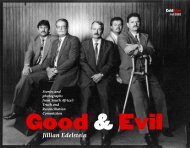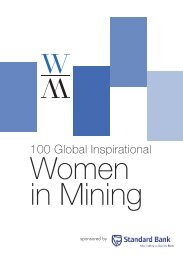school-inspection-report
school-inspection-report
school-inspection-report
You also want an ePaper? Increase the reach of your titles
YUMPU automatically turns print PDFs into web optimized ePapers that Google loves.
Castle House School 3<br />
2. THE QUALITY OF EDUCATION<br />
The Educational Experience Provided<br />
2.1 Castle House offers a good quality academic and all-round education which is consistent<br />
with the <strong>school</strong>’s aspirations and philosophy. It is highly successful in meeting its aim to<br />
nurture interesting and balanced young people in a happy and challenging environment. The<br />
curriculum has been refined further since the <strong>school</strong>’s last <strong>inspection</strong>.<br />
2.2 The curriculum covers not only the full range of National Curriculum subjects, but also<br />
incorporates additional subjects such as French, Spanish, religious education (RE) and<br />
PSHE. The physical education and games curriculum is excellent and pupils acquire fitness<br />
and good health as a result. Curriculum provision for children aged between two and four in<br />
the Nursery has been successfully launched. The Nursery curriculum is based upon the<br />
national guidance from birth leading to the Early Learning Goals.<br />
2.3 Curriculum planning is good. In some subjects, such as English, it is exemplary. Subject<br />
policies and schemes of work vary from good to excellent. All pupils have equal access to<br />
the curriculum and are encouraged to participate in a wide range of activities. The <strong>school</strong>’s<br />
curriculum is being enhanced by improving provision for information and communication<br />
technology (ICT). This is being done in a rolling programme from the Lower School<br />
onwards.<br />
2.4 The <strong>school</strong> promotes well the skills of speaking, listening, reading, writing and numeracy<br />
from an early age. These skills are built on from year to year and support pupils’ learning<br />
across the curriculum effectively.<br />
2.5 An extensive extra-curricular programme enhances learning opportunities considerably. This<br />
was recognised at the last <strong>inspection</strong> and it remains so now. In particular, gymnastics and<br />
chess are real strengths. A wide range of sporting activities is offered to both boys and girls.<br />
The Radio Club is a rare and valuable extra-curricular activity. Art, craft and computer clubs<br />
are also thriving and popular. Regular educational trips take place, including visits to the<br />
theatre and local museums, and these enrich pupils’ educational experiences.<br />
2.6 From an early stage, pupils are taught well by specialist teachers in a range of subjects. The<br />
good programme for PSHE enables pupils to learn about matters such as money<br />
management, preparation for examinations, family relationships and internet safety. It makes<br />
a good contribution to the fulfilment of the <strong>school</strong>’s aims and ethos.<br />
2.7 Good attention is paid to preparing pupils for the next stage of their education. Children are<br />
introduced to the Nursery sensitively and in a caring way. Pupils in Year 2 are prepared well<br />
for work in the Upper School and the transition from Year 2 to Year 3 is managed well.<br />
Liaison occurs with a broad range of senior <strong>school</strong>s to ensure a smooth transition for pupils<br />
in Year 6. Teachers from senior <strong>school</strong>s to which the pupils transfer visit Castle House and<br />
pupils have taster days at those <strong>school</strong>s. Pupils benefit from a wide choice of independent<br />
senior <strong>school</strong>s, maintained, selective grammar and non-selective <strong>school</strong>s. The <strong>school</strong><br />
prepares them well for entry examinations, which include the 11+.<br />
2.8 Teachers plan tasks and activities which are appropriate for the needs of their pupils,<br />
including those with LDD. The special educational needs co-ordinator (SENCO) works<br />
effectively with class teachers to identify pupils who have LDD, such as dyslexia. Where a<br />
statement of SEN has been provided, the <strong>school</strong> ensures that it matches its provision to the<br />
requirements of the statement. An individual educational plan is drawn up and discussed





